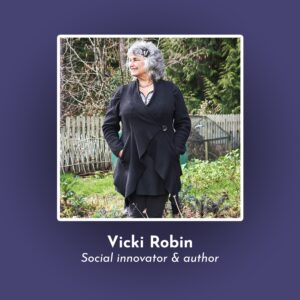
Ep 21 | Vicki Robin
Vicki Robin “Money and Life’s Energy”
On this episode, we meet with social innovator, writer, and speaker, Vicki Robin.
Robin unpacks how the machine of community begins. How does being vulnerable, sharing, and being obligated to others create a system that allows everyone to contribute? Why do we need to learn to begin asking for help?
Further, Robin shares how we can begin to take steps toward food resiliency. Robin shares the story of how she only ate food that was produced within a 10-mile radius of her home for 30 days, and how we should all begin to think and act locally.
About Vicki Robin
Vicki Robin is a prolific social innovator, writer and speaker. She is coauthor with Joe Dominguez of the international best-seller, Your Money or Your Life: Transforming Your Relationship With Money and Achieving Financial Independence (Viking Penguin, 1992, 1998, 2008, 2018). It was an instant NY Times best seller in 1992 and steadily appeared on the Business Week Best Seller list from 1992-1997. It is available now in twelve languages.
Blessing the Hands that Feed Us; Lessons from a 10-mile diet (Viking/Penguin 2014) recounts her adventures in hyper-local eating and what she learned about food and farming as well as belonging and hope.
In French, we have a motto that says that a simple drawing is often better than a long explanation. Jean-Marc Jancovici Carbone 4 President
That’s very understandable because with left atmosphere thinking, one of the problems is that you see everything as a series of problems that must have solutions. Iain McGilchrist Neuroscientist and Philosopher
We can’t have hundreds and hundreds of real relationships that are healthy because that requires time and effort and full attention and awareness of being in real relationship and conversation with the other human. Nate Hagens Director of ISEOF
This is the crux of the whole problem. Individual parts of nature are more valuable than the biocomplexity of nature. Thomas Crowther Founder Restor
Show Notes & Links to Learn More
Download transcript00:45 – Vicki Robin website, Your Money or Your Life, Blessing the Hands that Feed Us, FIRE community
06:58 – The Superorganism
08:44 – Money is a claim on energy
11:32 – Food deserts
11:58 – Wealth gap
17:11 – Post Carbon Institute
18:11 – 30% GDP drop during the Great Depression
21:57 – Siddhartha
24:30 – Thoreau
27:27 – Stoicism
29:44 – Decrease of insect biomass
29:45 – More plastic than fish in the ocean
29:55 – Coral populations dying
31:05 – Once basic needs are met, the best things in life are free
35:06 – The Ecological Footprint Mathis Wackernagel
37:04 – Hyperlocal eating – 10 mile diet
37:36 – Transition time movement
42:55 – The waning of reciprocity in modern culture
48:17 – Conversation Cafe
50:25 – Hero’s journey
53:52 – How to be
55:03 – Friday’s for Future







